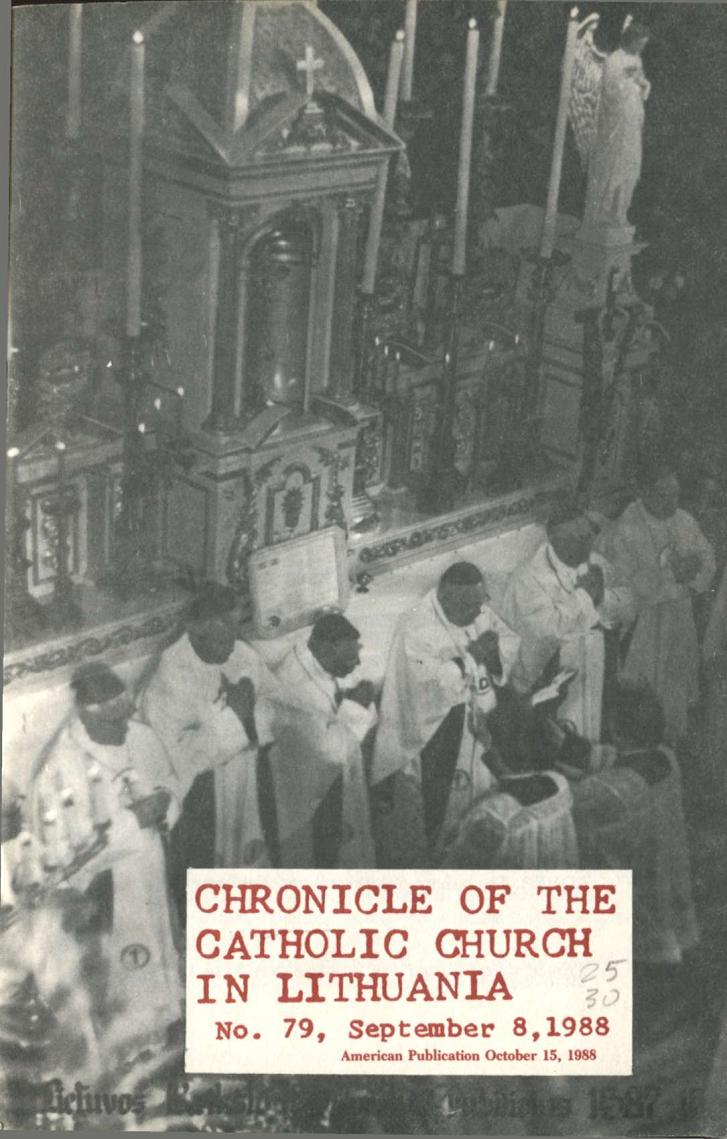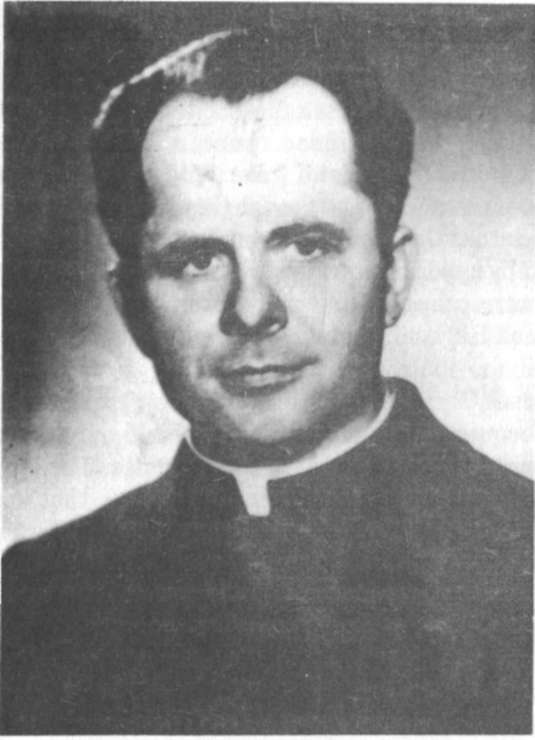
Appearing since 1972
Read this and pass it on!
This issue is dedicated to Father Alfonsas Svarinskas, a member of the Catholic Committee for the Defense of Believers' Rights, who spent 21.5 years in Soviet camps for God and Country, and last September 22, had to leave his homeland against his wishes.
CHRONICLE OF THE CATHOLIC CHURCH IN LITHUANIA, NO. 79 
In this issue:
1. Cardinal Vincentas Sladkevičius' Remarks at the Priests' Symposium
2. We Thank Him for His Sacrifice!
3. Father Alfonsas Svarinskas Bids Farewell
4. There Is No Freedom Without Freedom of Conscience (An Appeal to the Restructuring Movement)
Lithuania September 8,1988
From 1952 until 1957,1 had more than one occasion to speak in this modest seminary church. I had occasion to give meditations and conferences. In the long time which is past, much has changed. We know that changes are not all uniform: some are happy and some are sad. In the course of this long period of time, not all the changes were joyous. It would be difficult to recount all of the developments.
Today assembled in this solemn symposium celebrating the close of the Marian Year, and recalling the abundance of God's graces granted to us with the beatification of the Blessed Archbishop Jurgis Matulaitis, and the solemn anniversary of the beatification which took place not long ago in Marijampole, we feel in a very special way that the happiest changes began during the Marian Year. We can say as was said at one time at the wedding feast of Cana in Galilee, that the best has been kept until now.
It is precisely during the Marian Year that the most remarkable changes are taking place in our nation under the title of restructuring. Their special significance our nation experienced not so long ago in Vingis Park when, for the first time after so many years, tricolors waved so proudly . . . When questions of concern to the whole nation were considered. It is too bad that we do not see our national flag here today. Surely, it is no stranger to us? Surely, it is not something unworthy of our gaze, or are we unable to rejoice in that which our whole nation rejoices today? Surely all this is not unacceptable to the clergy? It is not without reason that those who experienced that joy of restructuring in Vingis Park threw it up to us clergy that we have become so alienated, without feeling, as if we did not desire restructuring or change, as if we had become entirely too accustomed to the sad situation. The restructuring movement gives me no peace. Delegations keep coming, one after another, asking why we remain silent. Let these remarks of ours only be like a reply, that we are not silent, that we are concerned.
On July 12, 1988, Father Alfonsas Svarinskas, who had been arrested January 26,1983, accused of anti-Soviet propaganda and agitation and sentenced under L.S.S.R. Criminal Code Par. 68 Id. to seven years strict regime labor camp and three years exile, was released from the Perm strict regime labor camp. After spending five-and-a-half years in various strict regime labor camps,
Father Svarinskas was released on condition that he leave the homeland and go to West Germany at the invitation of Bishop J. Stimpfle of Augsburg.
On the evening of July 15, 1988, Father Svarinskas arrived in Vilnius. Father Svarinskas, sentenced three times, and having spent 21.5 years in various camps in the gulag, having suffered much physically and mentally, returned to the homeland unbroken, full of resolve and energy, to continue working for the glory of God and the good of the nation.
Lithuania, trying to be re-born in its religious and national self-image, greeted this spiritual giant with respect and awe, receiving his words of instruction like a spiritual legacy to the nation. Father Svarinskas spent just over a month in Lithuania, visiting a whole list of parishes: Vidiškė, Viduklė, Telšiai, Tauragė, Šiluva, Igliauka, Kybartai, Marijampolė, Vilnius, Paberžė, etc., and everywhere he was welcomed by hundreds and thousands of loving hearts, the faithful of Lithuania, longing for his word.
May that which you, departing from your forebears' native land,
Left to blind fate of death and oppression:
Ancient tells, homesteads and the paths of dawn
Be light to the lost, when heaven is obscured,
When hopes and paths become confused.
What you, leaving homestead fences behind,
Took with you, when the painful switch touched the land —
Your ancients' blood - their name - in the flame of freedom in your hearts-
Bear as eternal memorial throughout this journey,
As a great treasure in your heart.
Both their sacred foot-prints, impressed in slavery,
And your days, dedicated to struggle and trouble—
The fate of your homestead, when a new mom dawns, -
Will remain a granite testament unfading
For days unending — to their children's children.
(Bernardas Brazdžionis)
My brothers and sisters in Christ! Everything good soon passes. Not long ago, we enjoyed a welcome celebration, and today, it is already time for a departure ceremony. I sincerely thank my brother priests, my dear parishioners and all those who assembled today in Vidukl6 to pray together, to strengthen one another, and then go our separate ways through life. Such is God's will!
(An Appeal to the Restructuring Movement Sąjūdis)
We, Catholics concerned for the renewal of society, wish to direct the attention of Sąjūdis to the fact that the democratization of society is not possible without bringing the rights of believing citizens up to par with the rights of all others, and without doing everything necessary to guarantee this equality and complete freedom of conscience.
1. Equality of rights. The Brezhnev Constitution now in effect (Art. 52), as well as the earlier Constitution of the U.S.S.R. under Stalin (Art. 124), clearly enshrines the inequality between believers and non-believers in principle. They guarantee unbelievers the right to propagate their beliefs, to carry on atheistic propaganda, while believers are guaranteed only the right to carry out religious worship, but not to spread their beliefs. So religious publishing is extremely limited, while all the mass media are obliged to propagate Soviet atheism. The very right of participating in religious worship is often denied to many citizens in various categories, especially the intellegentsia and young students.
To: The XIX All-Union Party Conference of the Soviet Communist Party From: Priests of the Catholic Church in Lithuania
A Petition
We are pleased and greatly encouraged by the words of General Secretary Mikhail Gorbachev of the Soviet Union Communist Party Central Committee, uttered in one of his speeches, "Believers are Soviet people, working people, patriots, and they have the complete right suitably to express their beliefs. Restructuring, democratization and openness effects them also. And that completely, without any restrictions." (Tiesa, April 30, 1988)
We feel a moral obligation to appeal to those who make future plans for the life of society and to express the opinion of the faithful about the wrongs which they have experienced. During the Stalin era and the period of stagnation in our nation, the people of all walks of life, among them priests and laity, suffered infinitely much. It hurts that although now, there is much talk about righting those wrongs, the process of restructuring with regard to religion on the part of government organs is almost unnoticeable.
1. We request that wrongs still going on at the present time be righted without delay; namely:
To allow Bishop Julijonas Steponavičius, exiled to Žagarė in 1961 without any trial, to return to Vilnius and carry out his episcopal duties without interference;
From the letters of Father Sigitas Tamkevičius:
"From Staro-Sainakov, they transferred me to Krivoshayn. I am living on the bank of the River Obe. I delivered mail only two days and after that they took the job away. The postmaster explained that "policy" does not allow me to work in the communications network. That same day, I found work in a factory making athletic equipment. Here, they make ice-hockey sticks and I plane the handles. There could be less noise and dust: my eyes, ears and lungs are full. Of course you must not imagine that this is some unbearable burden.

Father Sigitas Tamkevičius
People work for years on end and nothing happens.
"Moreover, for five years I was at the loom and in dust and... and everything else. And thank God that I did not forget to pray. I did not forget how to laugh, I did not forget that I am supported by very many good people to whom I am so indebted for their prayers and moral support. The work itself is not heavy. I only have to stand from 9:00 AM to 6:00 PM at the loom. In camp, the work at the loom was easier, and it was even easier to pray. Here, it is only during breaks that one can say the rosary and pray. However, because of this, I shall have Saturdays and Sundays free, while in camp, I was free only on Sundays. For everything I am grateful to God. He grants enough of everything, as much as necessary: whether health or strength or time or anything else, only we must not bury our God-given talents ...
Kaunas
On August 2,1988, at the Interdiocesan Theological Seminary in Kaunas, a symposium was held for the hierarchy and clergy of the Catholic Church in Lithuania. The symposium opened with a hymn to the Holy Spirit. Two papers were read: "Mary in a Priest's Life" and "The Pastoral Letters and Lessons of Blessed Jurgis Matulaitis, Archbishop of Vilnius." Holy Mass was concelebrated by Cardinal Vincentas Sladkevičius, Bishops A. Vaičius, J. Preikšas, J. Steponavičius and R. Krikščiūnas and about 30 priests.
During the Mass, Cardinal Vincentas Sladkevičius spoke on behalf of the bishops (see p. 2). The priests, attentively listening to the cardinal's remarks, voiced their support and confidence in the present hierarchy, and outrage at the government's interference in purely internal Church matters: crude handling of the Kaunas Theological Seminary and meddling with the assignment of priests. Everyone seconded the remarks of Father V. Jalinskas, the Dean of Lazdijai. It is disturbing that the final selection of applicants to the seminary is made by a government representative.
This year again, the list of candidates to the seminary was taken to Vilnius ... We must endeavor to free the Church from subservience to the interests of the state, to cut as much as possible the tentacles of this subjugation. The admission of young men to the Seminary is strictly the concern of the clergy and the current situation is unjust. A final stop must be put to the practice of terrorizing seminary applicants, by demanding pledges of cooperation with the security police, slandering priests and the priesthood itself.
Gervėčiai (Byelorussia)
Last year, in the parish of Gervėčiai, the majority of whose parishioners are ethnic Lithuanians, the 600-year Jubilee of Lithuania's Baptism had gone unobserved. The faithful made an attempt to commemorate it at least this year. They called on Bishop Julijonas Steponavičius, requesting his help (Bishop Steponavičius was born in the parish of Gervėčiai, the Village of Žiciūnai). The Bishop joined in the efforts of the faithful, personally sending a letter to Father Gvozdovich, the pastor of Gervėčiai, asking that in keeping with their request, he be permitted to officiate at the jubilee services. In their letter to the pastor, the faithful requested:
- That the ceremonies take place on May 29, 1988 (during the religious festival of the Holy Trinity), that the parishioners be notified of this in advance, that the Jubilee services start not at 11:00 as customary, but at 12:00, so that guests from Lithuania could arrive on time;
- That the picture of Blessed Archbishop Jurgis Matulaitis be hung in the Gervėčiai church.





